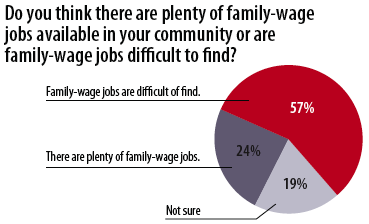 Family-wage jobs often are cited as an important building block for a healthy economy. Concern over having enough of those valuable jobs is the top worry of our 910 Input respondents this month.
Family-wage jobs often are cited as an important building block for a healthy economy. Concern over having enough of those valuable jobs is the top worry of our 910 Input respondents this month.
Family-wage jobs often are cited as an important building block for a healthy economy. Concern over having enough of those valuable jobs is the top worry of our 910 Input respondents this month. In the second of our three-part economic outlook survey, conducted by research partner Conkling Fiskum & McCormick, readers weigh in on the health of their own businesses.
While things seem good to them, they still express a nagging fear that there are too few family-wage jobs, and Oregon Labor Commissioner Dan Gardner shares that worry. He says he “absolutely agrees” that it’s the No. 1 concern.
The state sets $36,591 as the income level needed to qualify as an average-wage or family-wage job. But Gardner says he considers that a good family-wage job only if it comes with health and retirement benefits.
“Even if you make $36,000 a year, without health care, one incident can send you into bankruptcy,” he says. While jobs have grown in all wage-level categories since 2004, according to the state, low-wage industries have grown faster than average- or high-wage industries, which means that low-wage industries make up a growing share of Oregon’s employment. Low-wage jobs are classified as those with income of less than $28,830.
Many factors are responsible for the loss of average-wage jobs over the years, but a big contributor has been the drain of manufacturing jobs. Gardner says the state is working to attract more family-wage jobs by investing in those industries that provide higher pay and benefits, such as construction and alternative energy, and to continue to promote training and apprenticeship programs for high school students.
View slideshow

Next month, our readers tell us about their personal financial situations.
To participate in the Input survey, send an e-mail to [email protected].
Research conducted by Conkling Fiskum & McCormick.

